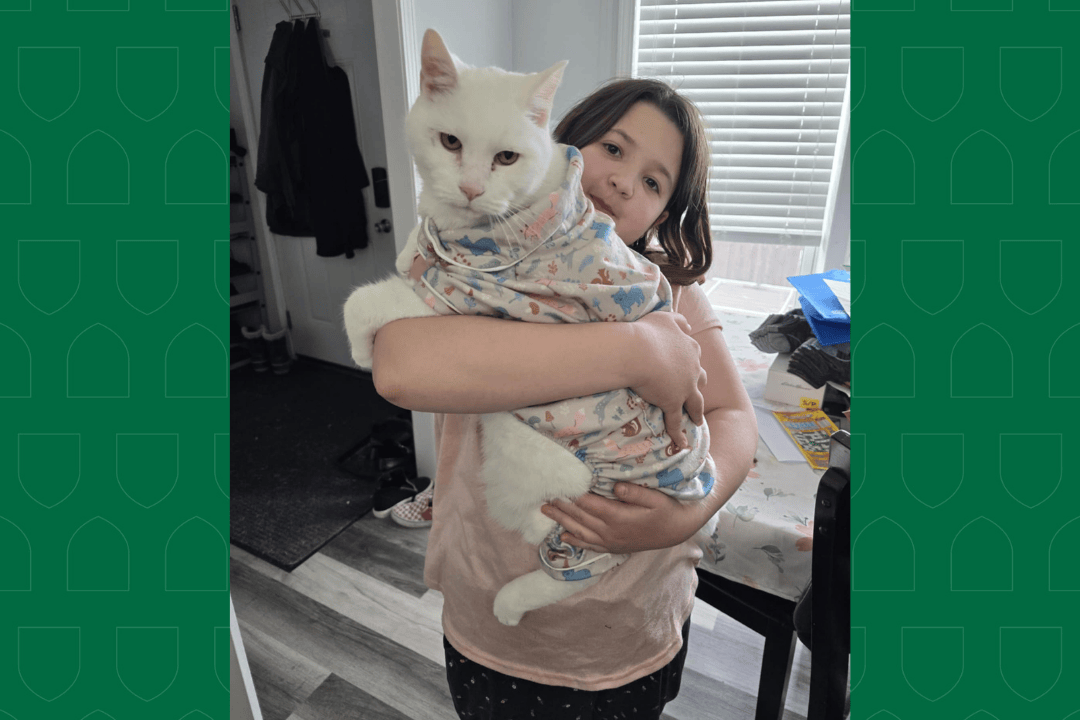
‘Everyone needs a Chonk’: how one cat changed a girl’s life
Passing time in a pet store in a city that’s 250 kilometres from home isn’t where you might expect to meet the pet that will change your life — but that was the case for the Helgason family of Kindersley, Sask.
By Rigel SmithIn a Medicine Hat pet store’s adoptable cat section, then eight-year-old Lena Helgason spotted a large fluffy white cat. Lena walked over and put her hand against the glass separating them and the cat stretched out his front paw and pressed it against the glass to meet her hand. Lena’s mother, Tami, recalls that moment as "something out of a storybook."
Lena, now 12, has always loved animals but often had trouble connecting with them. Lena is on the autism spectrum and has a diagnosis of attention deficit hyperactivity disorder (ADHD), which makes her very high energy, explains Tami. As a result, many animals shied away from her quick and unpredictable movements. But that big friendly white cat in the pet store, known affectionately as Chonk, was different.
While the family wasn’t looking to adopt another pet, they knew in that instant they weren’t leaving without him. The chance encounter came just days after saying goodbye to their first family cat.
“Chonk immediately took to her,” says Tami. “We had no intention of bringing another kitty into our home, but it was so weird and wonderful it just made sense.”
And the bond between the girl and her cat continued to develop on the two-and-a-half-hour drive home.
“He did not want to be in his little carrier,” recalls Lena. “He tried to pull the zipper open, so I helped a little bit and unzipped it. Then for the rest of the way home he sat with me.”
What followed that serendipitous meeting was five and a half years of unwavering friendship. Chonk was happy to do it all with Lena, whether it was being carted around in a handsewn sling, dressing up in princess costumes or sitting by Lena’s side for Garfield comic reading sessions.
But the pair’s relationship went further than simple companionship. Tami and Lena both agree that Chonk saved Lena’s life. For Lena, communication and self-regulation had always been a struggle. Tami recalls years of difficulty in school, particularly with social interactions and emotional regulation.
“It was just really hard for her. She didn't do well with communicating verbally, and when she did communicate, it often became a physical outburst,” explains Tami. “It didn’t seem to matter what we tried, nothing seemed to be clicking. But when Chonk became part of her life, that all started to change.”
“Some days I would have really bad days, and I didn't want to talk about it,” says Lena. “I would go home and I would go to him and I would tell him everything, and I felt like he understood me, even though I never said a word out loud. His fur and his purr would just calm me down and I would hug him, and he would make me feel better.”
“It was almost like she just needed that kind of secret safe space, and he gave her that,” adds Tami.
But then Chonk got sick. What they thought was a mild wheeze turned out to be something much worse and Chonk was having trouble breathing. When the problem persisted, the family’s veterinarian referred Chonk and his family to the Western College of Veterinary Medicine’s (WCVM) Veterinary Medical Centre (VMC), in Saskatoon, Sask. There, they received devastating news: Chonk had terminal cancer.
“We weren't really expecting to be told that he had any kind of a growth, but that’s what it was … there wasn't anything they could do,” says Tami.
The hospital’s veterinary oncology team prescribed prednisone, a steroid medication used to reduce inflammation that helped to ease Chonk’s breathing.
“It helped keep him really comfortable, and it meant that he got to be with us through the summer and got to stay with Lena through the summer, which we were very grateful for,” says Tami.
“He was an angel,” says Lena. “He was the best cat in the world.”
After Chonk’s passing in October 2024, Lena decided to donate all the money she had saved for a guitar — $125 — to the college’s Companion Animal Health Fund to help support pet health research and training at the WCVM. Lena’s older sister, Eli — who had previously lost a beloved dog — also decided to contribute $125 to the research fund.
“I really just wanted to help save the animals' lives so the animals could save people's lives,” explains Lena.
For Tami, the impact of their time with Chonk is immeasurable.
“I think her life would look very different now if she hadn’t had him,” she says.
“Chonk taught me that a small hug makes a big difference,” says Lena. “Everyone needs a Chonk.”
To read the full issue of the Summer 2025 Vet Topics click here.
Together, we will undertake the research the world needs. We invite you to join by supporting critical research at USask.
